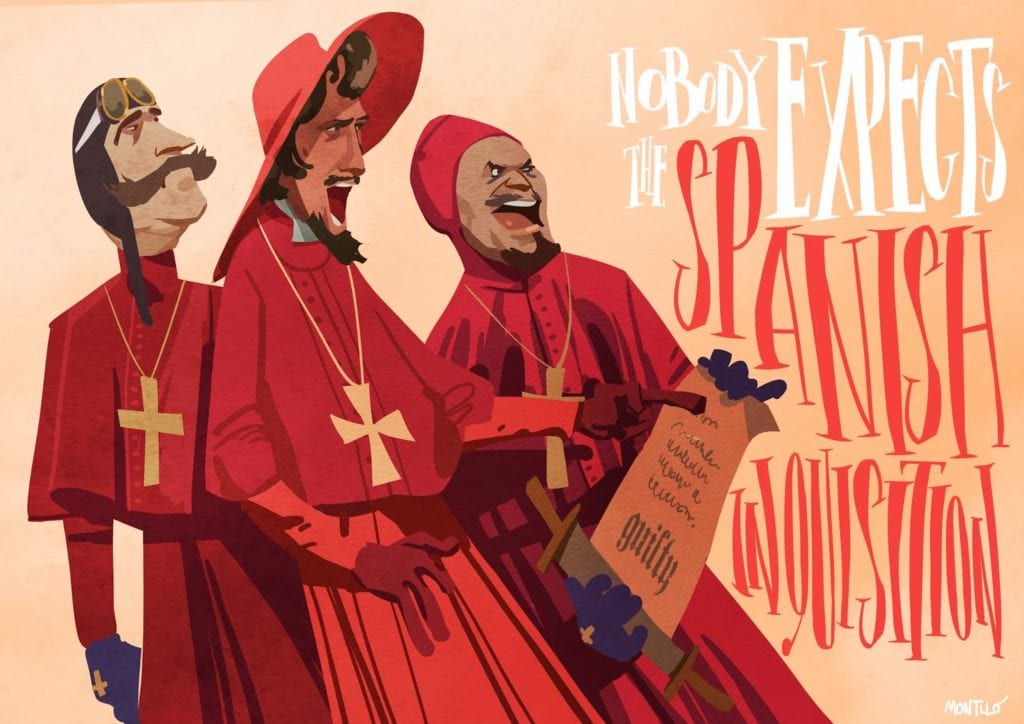
Illustration by Miki Montlló.
We live in the age of political correctness. No one should be surprised by such an obvious statement, but sometimes it doesn't hurt to remember it. Although in our country, at least in theory, we have had freedom of expression for a long time, there is a kind of social censorship that, because it is subtle, sibylline, and well-intentioned, is equal to or worse than your grandmother. After all, you used to see the censors coming, and you could act on it; but nowadays political correctness is a wolf in sheep's clothingIn such a way that those who go beyond what is acceptable are condemned to ostracism and public lynching.
This situation, although it affects all artists, is especially worrying in the case of writers, whose working tool are words. Many of them have to suffer daily from the mass of society criticizing what they say, and how they say it, and they are even judged and insulted for what they do not say. This last detail, apparently unimportant, is very significant. It shows that people have forgotten that art does not exist with the aim of being "correct" —We already have our daily social hypocrisy for that — but to extol both the beauty and the horror of the human condition.
Wickedness
However, as sure as my soul exists, I believe that perversity is one of the primitive impulses of the human heart, one of those indivisible first faculties or feelings that direct the character of man ... Who has not been surprised many times committing a foolish or vile action, for the sole reason that he knew he should not commit it? Do we not have a constant inclination, despite the excellence of our judgment, to violate what the law is, simply because we understand that it is the 'Law'?
Edgar Allan Poe, "The black cat. "
There is a chapter of The Simpsons in which a character asks: Can you imagine a world without lawyers? Then, visualize in your mind all the nations of the planet living in peace and harmony. It's a good joke. Everybody laughs.
Unfortunately we live in a world with lawyers, and ignoring that fact is an exercise as futile as it is optimistic. And by abogados I mean metaphorically to all possible horrors and calamities. From here, I apologize to whoever my words have offended, and want to point me in Twitter that he shouldn't have insulted said guild. Sorry, next time I'll tell a writers joke. I think some of you have already understood where I am going.

G from "Pop Team Epic", Bukubu Okawa's webcomic.
In this reality that we have to live in, there are not only lights, but also shadows, and the fact that we want to ignore them will not make them disappear. Within the heart of every human being lies a well of darkness, violence, and irrational selfishness. Literature, as a reflection of this heart of man, is not exempt from darkness, since evil is the germ of conflict, and conflict is the soul of every great story.
It is possible to sweeten the stories, and try to make them innocuous, as has happened to many popular tales. But this will ultimately only turn them into insipid, and even dehumanized, stories. From horror you learn and, as much as some adults find it difficult to accept it, even children can distinguish fiction from reality.

Original version of the story "Little Red Riding Hood", collected in "The Sandman: Dollhouse", a comic scripted by Neil Gaiman.
Political correctness
Damn the plain and vulgar writer who, without claiming anything other than to extol fashionable opinions, renounces the energy that he has received from nature, in order to offer us nothing but the incense that burns with pleasure at the feet of the party that dominates. […] What I want is for the writer to be a man of genius, whatever his customs and character may be, because it is not with him that I want to live, but with his works, and all I need is that there be truth in what it procures me; the rest is for society, and it has long been known that the society man is rarely a good writer. […] It is so fashionable to try to judge the customs of a writer by his writings; This false conception finds so many supporters today that almost no one dares to put a daring idea to the test.
Marquis de Sade, "The esteem due to writers."
It is not only the readers who censor more or less consciously. Unfortunately, today the writers themselves censor themselvesEither out of fear of expressing himself freely, or what is even worse, hoping that his works will be more "friendly" to the general public. It occurs mainly, although not exclusively, among new writers for fear of being misunderstood or carving out a bad reputation. And also, why not say it, among those who want to increase their sales.
This is born many times from a widespread error: identify the author with his work or one of the characters that appear in it. For example, that the protagonist of a novel murders a woman does not have to imply that the writer wants to do so. He is limiting himself to pointing out a reality that, whether we like it or not, exists, and can lead to a story in which the detective on duty must unmask the murderer. In the same way, that a character has some conspicuous paraphilia, such as a foot fetish, does not imply that the writer shares it. After all, we write about what we like because it fascinates us, but what we dislike also has its own appeal that can inspire us.
In short, I would like to encourage all the writers out there, racking their brains on their manuscripts, not to stifle their creativity; well it is history that chooses the writer, not the other way around. And anyway anything you write is going to offend someone.
“I can describe an ax going into a human skull in great, explicit detail and no one will blink. I offer a similar description, in the same detail, of a penis going into a vagina, and I get letters about it and people swear. In my opinion this is frustrating, crazy. Basically, in the history of the world penises entering vaginas have given pleasure to many people; axes going into skulls, well, not so much. "
George RR Martin.
I strongly disagree with some of the reflections in this article. First, as a writer that I am, I cannot conceive of when we placed ourselves at the top of the scale and were given a power capable of trampling the dignity of other human beings. Yes, there is freedom of expression, but, like all rights, this ends when the rights of others begin.
Therefore, the lack of knowledge of the author of this article is evident when giving as an example a femicide as part of the plot of a novel. The problem here is not the death of the woman (it would be strange if there were no deaths in a story), the problem appears when the author expresses his macho / racist / homophobic ideology, etc. in the story and perpetuates negative stereotypes based on the authority that it gives it a majority.
I'll sum it up in one sentence: it's called respect.
Good morning, Piper Valca. I respect your opinion, although I do not share it either. I think he has stayed with the anecdotal of the article at the time of elaborating this comment, and not with the substance.
I gather that you must be deeply offended by works like "Men Who Loved Women" by Stieg Larsson, or to take a more classic example, Euripides's tragedy "Medea." I would like to remind you, although it is certainly not necessary as a novelist, that fiction is one thing, and reality is another. That an author describes despicable events and characters does not mean that he agrees with such events and individuals.